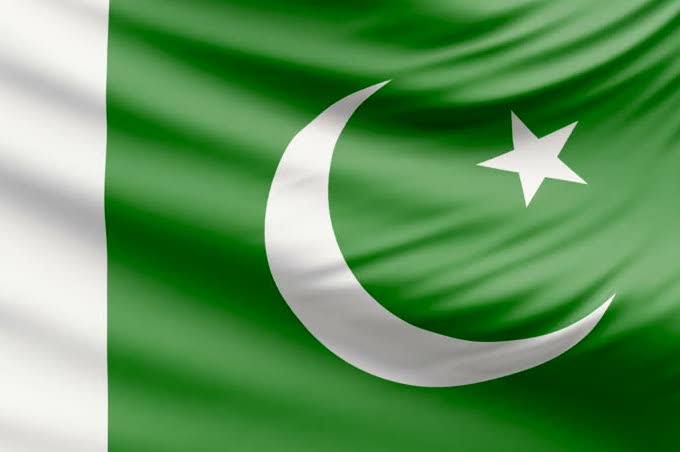
Jan 16, 2019
The trial of civilians by military courts is a glaring surrender of human rights and fundamental freedoms, found the ICJ in its Briefing Paper Military Injustice in Pakistan released today.
The Pakistani Government must not extend the tenure of military courts to try civilians for terrorism-related offences, the ICJ said.
“Military trials of civilians have been a disaster for human rights in Pakistan,” said Frederick Rawski, ICJ’s Asia Director.
“As a recent judgment of the Peshawar High Court has confirmed, proceedings in these tribunals are secret, opaque, and violate the right to a fair trial before an independent and impartial tribunal,” he added.
In the briefing paper, the ICJ has documented serious fair trials violations in the operation of military courts, including: denial of the right to counsel of choice; failure to disclose the charges against the accused; denial of a public hearing; failure to give convicts copies of a judgment with evidence and reasons for the verdict; and a very high number of convictions – more than 97 per cent – based on “confessions” without adequate safeguards against torture and ill treatment.
The ICJ has also demonstrated how military courts are being used to give legal cover to the practice of enforced disappearances.
The use of military courts to try civilians is inconsistent with international standards, the ICJ recalled.
According to the military, in the four years since military courts were empowered to try terrorism-related offences, they have convicted at least 641 people. Some 345 people have been sentenced to death and 296 people have been given prison sentences. Only five people have been acquitted. At least 56 people have been hanged.
An earlier law giving military courts authority to try civilians will lapse on 30 March 2019. Last week, the Cabinet approved a proposal to extend the tenure of military courts for another two years. The Government is currently in consultation with opposition parties to get consensus on the extension.
“Extending the tenure of military courts is an attempt to deflect attention from the real issue: the Government’s failure to enact reforms to strengthen the criminal justice system during the four years military courts have been in operation,” said Rawski.
“The Government must account for its failure to deliver on the promise of delivering justice for the victims of terrorism and other abuses in Pakistan instead of once again extending the “exceptional” use of military courts for civilian trials,” he added.
The ICJ fears that repeated extensions risk making the practice effectively permanent.
If the Government decides to table legislation to extend the tenure of military courts, the Parliament must take a stand in defense of the rights of all people in Pakistan, instead of once again extending a discredited and abusive process, the ICJ says.
Contact
Frederick Rawski (Bangkok), ICJ Asia Pacific Regional Director, e: frederick.rawski(a)icj.org
Reema Omer, ICJ International Legal Advisor (South Asia) t: +447889565691; e: reema.omer(a)icj.org
Additional Information
The National Assembly and Senate of Pakistan passed the 21st amendment to the Constitution in January 2015, authorizing military courts to try civilians for terrorism-related offences for a period of two years. The 21st amendment lapsed on 6 January 2017.
Despite earlier promises that military courts were only temporary and “exceptional”, after the expiration of the 21st Amendment, Parliament enacted on 30 March 2017 the 23rd Amendment and amendments to the Army Act to renew military courts’ jurisdiction over civilians. The amendments were given retrospective effect from 7 January 2017, and were due to lapse two years after their date of “commencement”.
According to the law ministry, the expanded jurisdiction of military courts will lapse on 30 March 2019. (Earlier reports had suggested the amendments expired on Jan 6, 2019 — two years after the date of “operation” of the 23rd Amendment.)
Pakistan-military courts-Advocacy-Analysis brief-2019-ENG (full briefing paper in PDF)
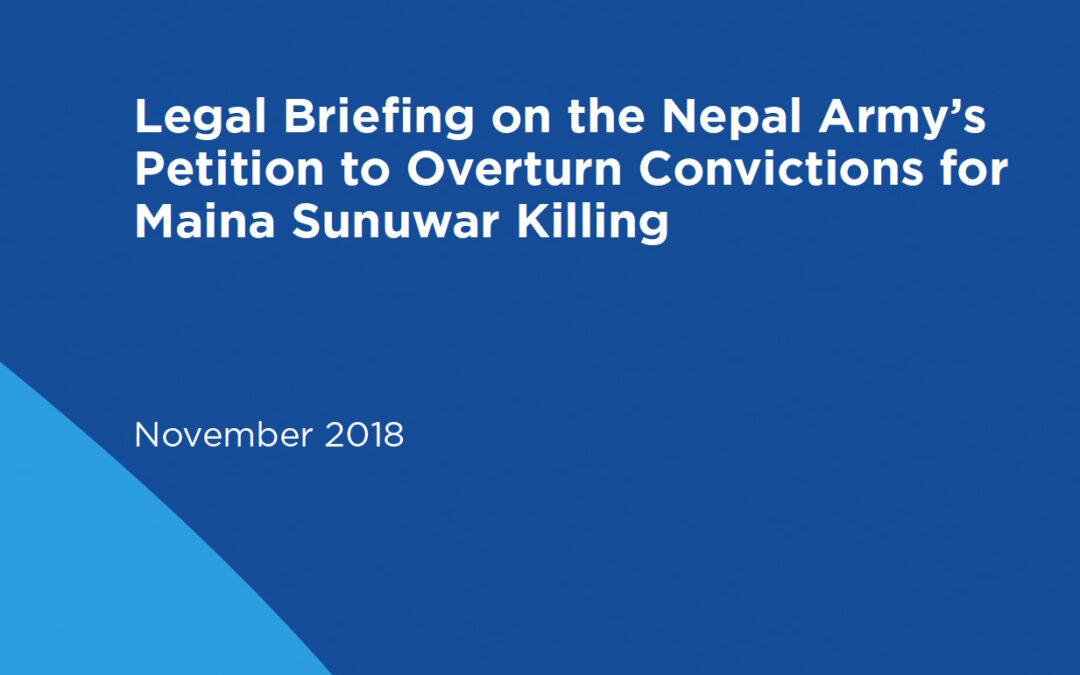
Nov 20, 2018
The ICJ said today that the Nepal Army’s petition before the Supreme Court seeking to overturn convictions of soldiers for the 2004 killing of 14-year-old Maina Sunuwar was riddled with legal flaws. Its success would be a blow to the fight against impunity in Nepal.
On the 12th Anniversary of the signing of the Comprehensive Peace Agreement (CPA), the ICJ released an analysis of the Nepal Army’s legal arguments in the petition to upend the convictions issued by the Kavrepalanchowk District Court for the killing Maina Sunuwar while in Army custody.
“The Nepal Army has sought to overturn the convictions of Maina’s killers by putting forth specious legal arguments that do not hold up under Nepali or international law, or in light of the past decisions of the Supreme Court,” said Frederick Rawski, ICJ Asia Pacific Director.
In the legal briefing, the ICJ sets out (i) Nepal’s obligations under international law and the Nepal Supreme Court’s jurisprudence to investigate and prosecute perpetrators of human rights violations; (ii) the impropriety of jurisdiction by a military court-martial in cases of serious human rights violations; and (iii) refutes the argument that the convictions violated principles of ‘double jeopardy’.
The briefing sets out international law and jurisprudence establishing the Government’s duty to prosecute serious human rights violations as distinct and separate from its obligation to establish the truth, including as part of a transitional justice process.
The briefing comes at a moment when the future of justice for conflict era crimes and human rights violations in Nepal is uncertain.
In July, a draft bill amending the existing legislative framework governing the transitional justice process was criticized by civil society, victim groups and human rights organizations – including in a joint analysis by the ICJ, Amnesty International and Trial International.
While a government panel elicited comments at consultations with victims and civil society, the government never produced a revised draft or conducted follow-up.
“How can the people of Nepal, and particularly conflict victims, have faith in government proposals to press forward on transitional justice when the Nepal Army continues to fight even minimal accountability with disingenuous legal arguments, such as in the case of Maina Sunuwar?” said Rawski.
“The foundation for any process moving forward must be the best interests of victims, a commitment to accountability, and respect for international human rights obligations. This has been affirmed many times over by the Supreme Court,” he added.
Contact
Frederick Rawski, ICJ Asia Pacific Director, t: +66 64 478 1121 ; e: frederick.rawski@icj.org
Background
Maina Sunuwar was subjected to enforced disappearance, torture and unlawful killing after a covert military operation, which included the involvement of then captain Niranjan Basnet on 17 February 2004.
The military refused to acknowledge Maina’s detention for many months.
After overcoming a number of procedural and political hurdles stretching over years, on 16 April 2017, the Kavre District Court sentenced three retired army officers to life imprisonment for Maina Sunuwar’s murder.
In September 2017, the Nepal Army filed a writ petition in the Supreme Court challenging the decision of the Kavre Court on several grounds, including that military courts had proper jurisdiction over the original case, that the District Court convictions violated the principle of ‘double jeopardy’ because the defendants had already been tried by a court-martial, and that the court system no longer had jurisdiction over conflict-related cases following the establishment of transitional justice institutions.
Nepal-Petition to overturn convictions for Maina Sunuwar killing-Advocacy-Analysis brief-2018-ENG (Full Analysis brief, in PDF)
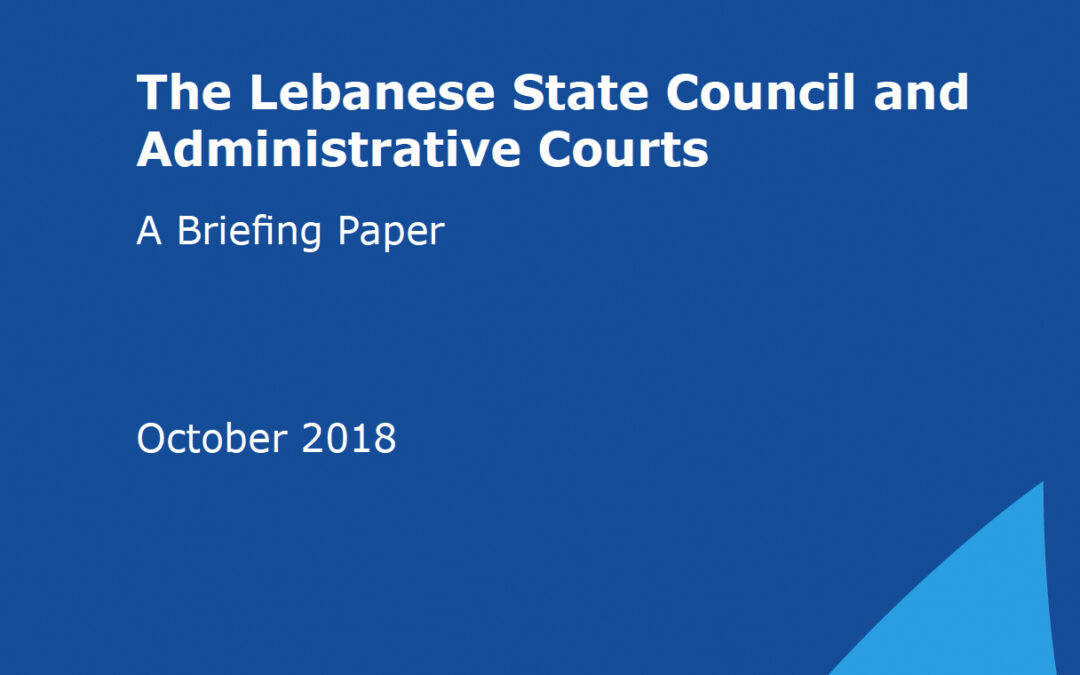
Oct 25, 2018
In a memorandum published today, the ICJ called on the Lebanese authorities to introduce comprehensive reforms to enhance the independence and impartiality of the administrative courts system, in particular by divesting the executive of any role in the selection, appointment and disciplining of administrative judges.
“The Lebanese authorities must set out transparent procedures for the selection and appointment of administrative judges, including in senior judicial positions,” said Said Benarbia, ICJ MENA Director.
“While such appointments should in principle seek to reflect the diversity of the Lebanese society as a whole, including its various religious groups, they must be based on objective criteria, including legal qualifications, skills, experience and integrity,” he added.
The power to take decisions relating to the management of judges’ careers, including promotions, transfers, and disciplinary proceedings, should be exclusively reserved to the State Council Bureau once the framework governing its composition and mandate is reformed.
The Lebanese authorities should ensure that the State Council Bureau is independent and consists of a majority of judges who are elected by their peers from the State Council and, once they are established, from first instance administrative courts.
The membership of the State Council Bureau should also reflect a gender balance.
The Lebanese authorities should also amend the Statute of the State Council with a view to enhancing the individual independence of administrative judges.
“The conditions for the transfer, assignment or secondment of administrative judges should be clearly defined in the law and the entire process must not compromise judges’ individual independence, including through the use of secondment as a reward for judges,” Benarbia said.
The ICJ is also concerned that the disciplinary system does not fully conform to international standards and has the potential to compromise judges’ individual independence.
The Lebanese authorities must rescind the powers of the Ministry of Justice in relation to the disciplinary procedure, including the authority to initiate disciplinary investigations and to refer matters to the Disciplinary Council.
“Disciplinary offences must be clearly and precisely defined within the law and related procedures must guarantee judges’ rights to a fair hearing before an independent and impartial body, including the right to have decisions and sanctions reviewed by a higher judicial body,” Benarbia added.
Contact:
Said Benarbia, Director of ICJ’s Middle East and North Africa Programme, t: +41-22-979-3817; e: said.benarbia(a)icj.org
Lebanon-Memo re Court Reform-Advocacy-Analysis Brief-2018-ENG (Memo in English, PDF)
Lebanon-Memo Courts System launch-New-2018-ARA (Story in Arabic, PDF)
Lebanon-Memo Court Reform-Advocacy-Analysis Brief-2018-ARA (Memo in Arabic, PDF)
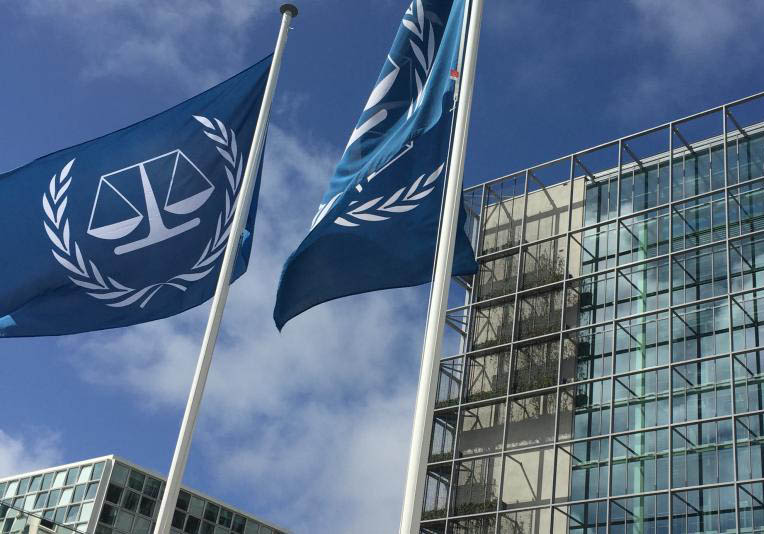
Sep 13, 2018
The ICJ today issued a briefing note following the Independent International Fact-Finding Mission on Myanmar and the ICC ruling relating to Bangladesh.
Fact-Finding Mission identifies crimes, calls for ICC referral and IIIM
On 27 August 2018, the Independent International Fact-Finding Mission on Myanmar (FFM) released a report finding that members of Myanmar’s military should be investigated and prosecuted for crimes against humanity and war crimes in Rakhine, Kachin and Shan States, and for genocide in the north of Rakhine State.
The FFM identified that many of the same kinds of crimes committed against the Rohingya in Rakhine State, were also being committed by the same or linked military authorities against other minorities in Kachin and Shan states.
While the FFM focused on the situations in Kachin, Rakhine and Shan States since 2011, it noted “serious allegations have also arisen in other contexts, meriting further investigation.”
The FFM concluded by recommending among other things that:
- the UN Security Council should refer the situation to the International Criminal Court (ICC) or create an ad hoc international criminal tribunal; an
- until the Security Council acts, the General Assembly or the Human Rights Council should create an independent evidence gathering mechanism, similar to the IIIM for Syria.
ICC ruling on jurisdiction re: Bangladesh
On 6 September 2018, an ICC Pre-Trial Chamber ruled that the Court could exercise jurisdiction over the alleged deportation (as a crime against humanity) of the Rohingyas from Myanmar into Bangladesh, since one element of the crime (crossing a border) took place in Bangladesh, which is a State party to the Rome Statute.
The Chamber noted that the same rationale could apply to other crimes within the jurisdiction of the Court “if it were established that at least an element of another crime … or part of such a crime is committed on the territory of a State Party,” citing persecution and other inhumane acts as possible examples in this case. The crime of genocide was not directly addressed.
The ruling did not address other crimes allegedly committed against the Rohingya, or crimes against other minorities elsewhere within Myanmar, including in Shan and Kachin States.
The proceeding is still at an early, pre-investigation, phase. If at the conclusion of a preliminary examination the Prosecutor assesses that there is a reasonable basis to proceed with an investigation, she must first seek authorization from the Pre-Trial Chamber.
The preliminary examination phase has been known to take from less than a week (Libya) to more than 14 years (Colombia).
Need for an IIIM or similar independent evidence gathering mechanism
An independent evidence gathering mechanism, with functions similar to those of the IIIM for Syria, should be created by the Human Rights Council as a matter of urgency.
- The passage of time increases the chances that critical evidence will deteriorate or be lost entirely, reducing the possibility of effective prosecution.
- An IIIM mechanism would ensure that evidence is collected, preserved and analyzed to a standard and methodology facilitating its use in national, regional or international courts.
- The delay and uncertainty associated with referring the question of creation of a mechanism to the General Assembly mean the Council should establish the mechanism at this session.
The ICC ruling relating to Bangladesh does not reduce the need for an IIIM:
- The limited scope of the ruling relating to Bangladesh creates a high risk that the existing ICC proceeding will not cover all crimes under international law against the Rohingya, or other crimes against other minorities elsewhere in Myanmar, including Kachin and Shan states.
- At best, the ICC will only be able to prosecute a fraction of the crimes identified by the FFM, and an even smaller fraction of the perpetrators, leaving an impunity gap. An IIIM will preserve evidence to enable that gap to be filled now, or later, by national courts or other tribunals.
- The work of an independent evidence gathering mechanism would be complementary to and cooperate with any ICC investigation and prosecution (or that of an ad hoc tribunal).
Referral of Myanmar to the ICC
States should continue to call for Security Council referral to the ICC despite the jurisdictional ruling relating to Bangladesh.
- With a Chapter VII referral, the ICC would assume jurisdiction over all crimes listed in the Rome Statute that may have been committed after the Rome Statute entered into force on 1 July 2002 either in the territory of Myanmar or elsewhere by a Myanmar national.
Contact:
Kingsley Abbott, Senior Legal Adviser (Global Accountability), kingsley.abbott(a)icj.org
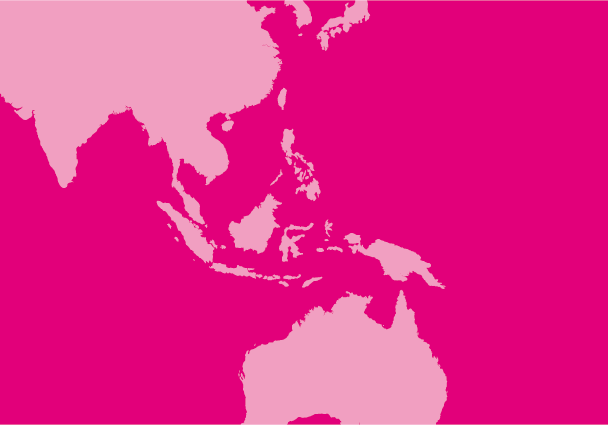
Sep 7, 2018
On 30 May 2018 the Government of Myanmar announced its latest “International Commission of Enquiry” (ICOE) to investigate human rights violations in Rakhine State.
Its creation follows at least eight other special government inquiries and boards conducted since 2012 in Rakhine State alone.
In a five-page legal briefing, the International Commission of Jurists (ICJ) assesses the inquiry in reference to standards on the conduct of investigations.
The ICJ finds that the ICOE cannot reasonably be seen as having any chance of being independent, impartial, or making an effective contribution to justice or accountability for the crimes under international law. To the contrary, giving any recognition to it is likely to undermine and delay effective international measures for justice and accountability.
On 28 August the spokesperson for the Office of the President stated that:
“We have formed the Independent Commission of Enquiry to response [sic] to false allegations made by the UN Agencies and other international communities.”
Indeed, the Chairperson of the ICOE stated at a press conference, that:
“[T]here will be no blaming of anybody, no finger-pointing of anybody… saying you’re accountable.”
Such prejudicial statements confirm the conclusion of the United Nations Independent International Fact-Finding Mission (IIFFM), that:
“The Government’s recently-created Commission of Inquiry will not and cannot provide a real avenue for accountability, even with some international involvement. The impetus for accountability must come from the international community.”
Crimes against humanity and war crimes have been committed in Myanmar, and an investigation of evidence of the crime of genocide is warranted, according to the summary report of the UN IIFFM, published on 27 August 2018.
Throughout Myanmar the rule of law is severely undermined by a lack of accountability for perpetrators of rights violations; lack of access to remedies and reparation for victims; and persistent challenges to the independence of the justice system.
In current circumstances it is impossible to rely on any national courts, prosecution services, or commissions of inquiry in Myanmar to deliver justice or accountability of security forces in relation to human rights violations constituting crimes under international law.
The UN Security Council should refer the situation to the International Criminal Court or a similarly constituted international tribunal without delay.
The UN Human Rights Council should promptly establish a robust International Impartial and Independent Mechanism (IIIM) or similar mechanism, to collect and analyse evidence for future prosecutions; action should be taken by the Council at its September 2018 session – waiting for or deferring to the UN General Assembly to act would risk further delaying or denying justice for victims, including because key criminal evidence could be irretrievably lost, destroyed, or deteriorate in the meantime.
Contact
Frederick Rawski, Asia and the Pacific Director, frederick.rawski(a)icj.org
Legal briefing
Myanmar-COI cannot deliver justice or accountability-Advocacy-Analysis brief-2018-ENG (full text, PDF)
Myanmar-COI cannot deliver justice or accountability-Advocacy-Analysis brief-2018-BUR (full text in Burmese, PDF)









